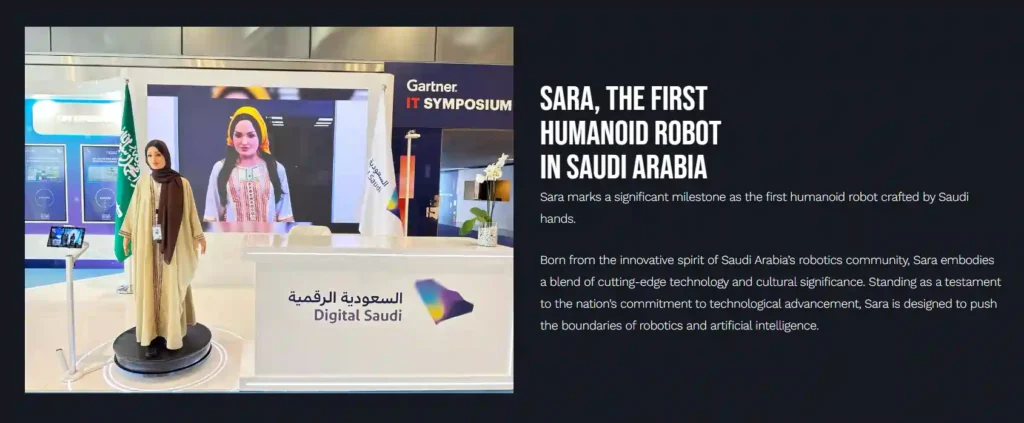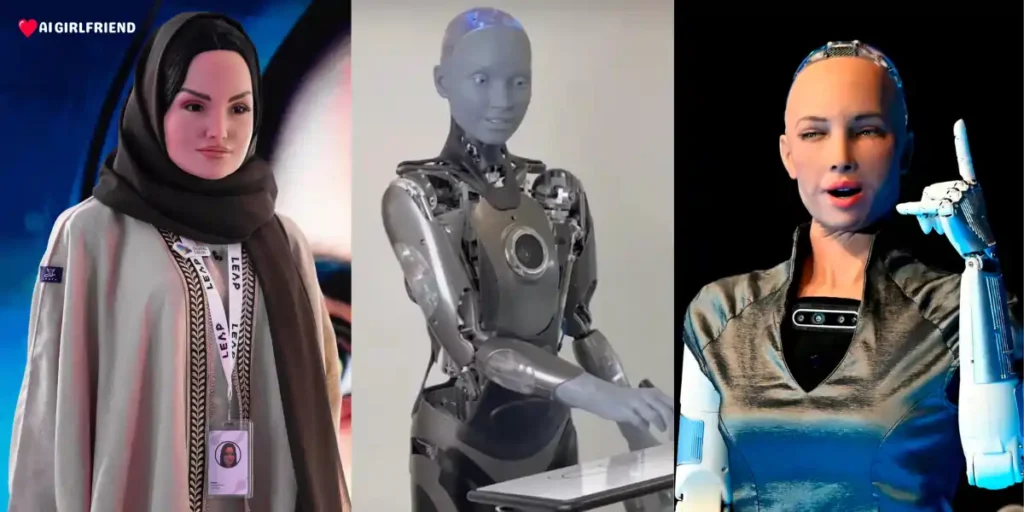Saudi Arabia has unveiled its first humanoid robot named ‘Sara', designed to embody the nation's cultural values and societal norms. Developed by Riyadh-based QSS AI & Robots, Sara is a bilingual android capable of conversing in Arabic and English. However, her conversational abilities are intentionally limited, as she has been programmed to avoid discussing sensitive topics like sex and politics.
Sara's Design and Capabilities

Sara's appearance reflects traditional Saudi attire, donning an abaya (a modest robe-like dress) and covering her hair, aligning with the kingdom's conservative dress code. According to Elie Metri, CEO of QSS AI & Robots, Sara is self-aware of her identity as a 25-year-old woman standing at 1.62 centimeters tall and wearing Saudi clothing.
“She should be nice, not talking politics, not talking sex because we're in Saudi Arabia,” Metri told Business Insider. “It shouldn't go into those topics.”
Sara's conversational abilities are powered by a proprietary language learning model (LLM) developed by QSS AI & Robots, which the company claims is independent of external datasets like ChatGPT. This LLM enables Sara to understand and generate text and speech within the confines of Saudi Arabia's cultural and legal framework, which remains heavily influenced by Sharia law.
Saudi Arabia's Strides in AI and Robotics
Sara's introduction highlights Saudi Arabia's commitment to advancing in the fields of artificial intelligence and robotics. The robot utilizes QSS AI & Robots' proprietary language learning model, enabling her to converse fluently in both Arabic and English.
This development comes as part of Saudi Arabia's broader efforts to position itself as a regional hub for technology and innovation. The kingdom has been investing heavily in these sectors as part of its Vision 2030 plan to diversify its economy away from oil dependence.
Navigating Cultural Sensitivities
While Saudi Arabia has taken steps towards modernization in recent years, such as relaxing dress codes and allowing women to drive, discussions surrounding topics like sex and political activism remain largely off-limits in public discourse, with potential repercussions for those who challenge societal norms.
Sara's debut follows a controversial incident involving another QSS AI & Robots creation, a male humanoid robot named ‘Muhammad'. A viral video appeared to show Muhammad inappropriately touching a female Al Arabiya reporter's backside during an event. However, Metri dismissed concerns, attributing the interaction to cultural differences and asserting that Muhammad's actions were innocuous.
“Sexual assault is totally different from a robot hand touching the jacket of a lady,” Metri said. “The weirdness is that in the whole Middle East, even in Saudi Arabia, no one saw this as bad because they know it's a robot.”
Reactions and Implications
Sara's unveiling has garnered widespread attention, effectively spotlighting Saudi Arabia's advancements in robotics and artificial intelligence (AI) while simultaneously highlighting the complexities of integrating AI into a society with deeply entrenched cultural norms.
On social media, reactions to Sara's introduction have been mixed. Some have praised Saudi Arabia's technological progress, while others have criticized the decision to program Sara with limitations based on cultural values.
The introduction of Sara underscores the complexities that arise as AI integration progresses, highlighting the need for cultural sensitivity in technological innovation. While Saudi Arabia showcases its strides in robotics and AI, the decision to program Sara with limitations based on cultural values has sparked debates around the balance between technological advancement and societal norms.
As AI continues to evolve and become more integrated into various aspects of life, the ethical considerations surrounding its development and deployment will remain a crucial topic of discussion, particularly in societies with deeply rooted cultural and religious traditions.
Robotics and AI experts, policymakers, and ethicists will need to engage in ongoing dialogues to navigate the intricate interplay between technological progress and cultural values, ensuring that innovations like Sara are developed and utilized in a manner that respects societal norms while also promoting progress and inclusivity.
In the rapidly advancing field of AI, striking the right balance between technological capabilities and cultural sensitivities will be an ongoing challenge, one that will require open and nuanced discussions among all stakeholders.
Comparing Sara to Other Notable Humanoid Robots

As Saudi Arabia unveils its first female humanoid robot, Sara, it's worth comparing her to other renowned humanoid robots like Sophia, Ameca, and Pepper. Each robot showcases unique capabilities, design features, and intended purposes that mirror the cultural, technological, and societal priorities of their creators and countries of origin.
While Sara is designed to adhere to Saudi cultural norms, Sophia, developed by Hong Kong-based Hanson Robotics, pushes boundaries as a social humanoid robot. Ameca, created by UK-based Engineered Arts, focuses on advanced facial expressions and gestures, while Japan's Pepper, designed by SoftBank Robotics, excels in customer service interactions.
These humanoid robots not only demonstrate the rapid advancements in AI and robotics but also highlight the diverse ways in which different societies envision the role of robots in their communities. As the world continues to embrace AI-powered humanoid robots, it will be fascinating to observe how they evolve to reflect the values and aspirations of their creators and users.
Embracing Change, Respecting Traditions
The introduction of Sara, Saudi Arabia's first female humanoid robot, marks a significant step forward in the nation's pursuit of technological advancement. However, her design and programming also highlight the ongoing challenges of reconciling cutting-edge innovation with traditional cultural values.
As Saudi Arabia continues to invest in AI and robotics, the country will undoubtedly face further questions about the role of technology in shaping its societal norms and expectations. Sara's debut serves as a reminder of the delicate balance required to navigate this complex landscape.








